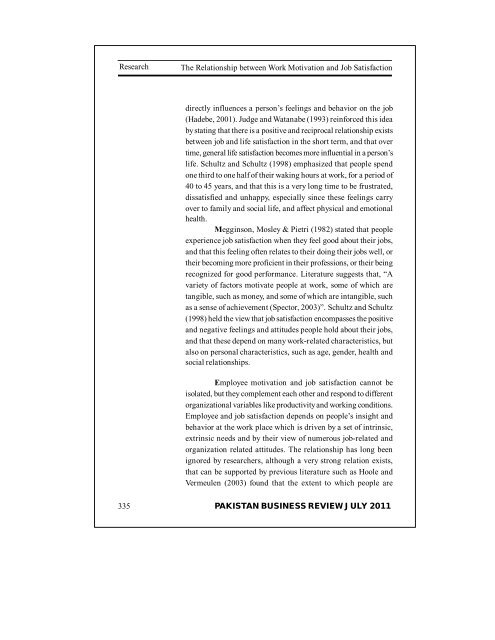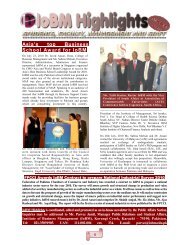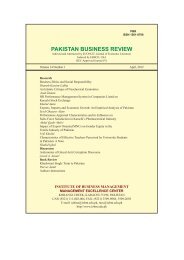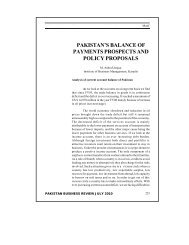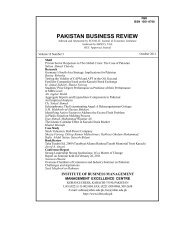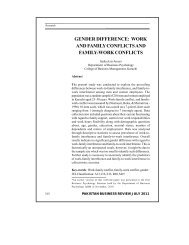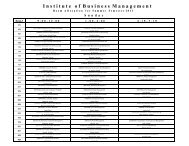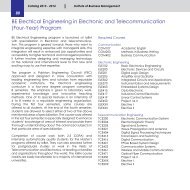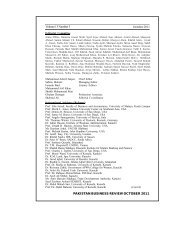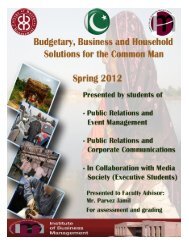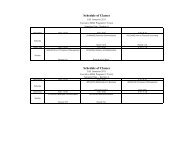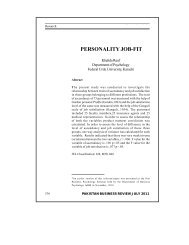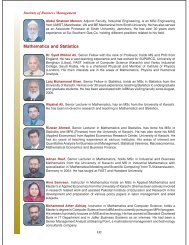PAKISTAN BUSINESS REVIEW - Institute of Business Management
PAKISTAN BUSINESS REVIEW - Institute of Business Management
PAKISTAN BUSINESS REVIEW - Institute of Business Management
You also want an ePaper? Increase the reach of your titles
YUMPU automatically turns print PDFs into web optimized ePapers that Google loves.
Research<br />
The Relationship between Work Motivation and Job Satisfaction<br />
directly influences a person’s feelings and behavior on the job<br />
(Hadebe, 2001). Judge and Watanabe (1993) reinforced this idea<br />
by stating that there is a positive and reciprocal relationship exists<br />
between job and life satisfaction in the short term, and that over<br />
time, general life satisfaction becomes more influential in a person’s<br />
life. Schultz and Schultz (1998) emphasized that people spend<br />
one third to one half <strong>of</strong> their waking hours at work, for a period <strong>of</strong><br />
40 to 45 years, and that this is a very long time to be frustrated,<br />
dissatisfied and unhappy, especially since these feelings carry<br />
over to family and social life, and affect physical and emotional<br />
health.<br />
Megginson, Mosley & Pietri (1982) stated that people<br />
experience job satisfaction when they feel good about their jobs,<br />
and that this feeling <strong>of</strong>ten relates to their doing their jobs well, or<br />
their becoming more pr<strong>of</strong>icient in their pr<strong>of</strong>essions, or their being<br />
recognized for good performance. Literature suggests that, “A<br />
variety <strong>of</strong> factors motivate people at work, some <strong>of</strong> which are<br />
tangible, such as money, and some <strong>of</strong> which are intangible, such<br />
as a sense <strong>of</strong> achievement (Spector, 2003)”. Schultz and Schultz<br />
(1998) held the view that job satisfaction encompasses the positive<br />
and negative feelings and attitudes people hold about their jobs,<br />
and that these depend on many work-related characteristics, but<br />
also on personal characteristics, such as age, gender, health and<br />
social relationships.<br />
Employee motivation and job satisfaction cannot be<br />
isolated, but they complement each other and respond to different<br />
organizational variables like productivity and working conditions.<br />
Employee and job satisfaction depends on people’s insight and<br />
behavior at the work place which is driven by a set <strong>of</strong> intrinsic,<br />
extrinsic needs and by their view <strong>of</strong> numerous job-related and<br />
organization related attitudes. The relationship has long been<br />
ignored by researchers, although a very strong relation exists,<br />
that can be supported by previous literature such as Hoole and<br />
Vermeulen (2003) found that the extent to which people are<br />
335<br />
<strong>PAKISTAN</strong> <strong>BUSINESS</strong> <strong>REVIEW</strong> JULY 2011


